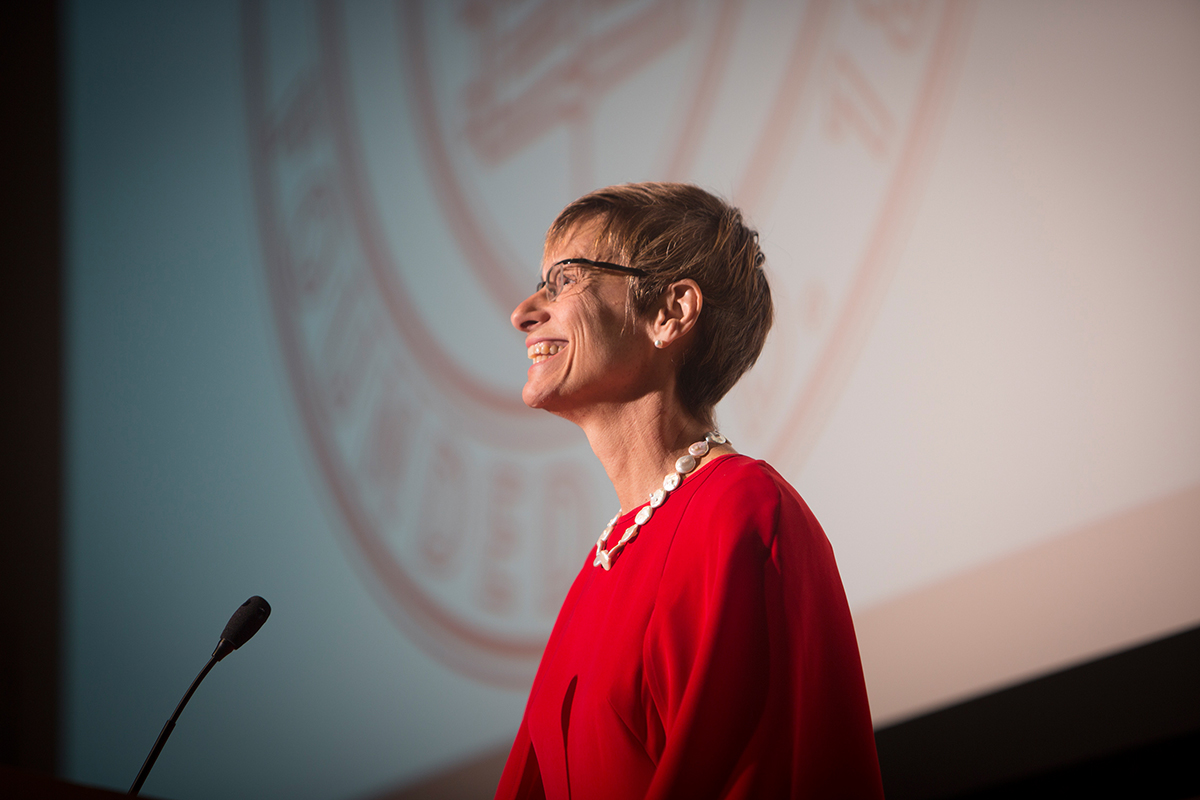Garrett outlines agenda in State of University address
By Nancy Doolittle

Building on the themes of her Sept. 18 inaugural address, President Elizabeth Garrett laid out an agenda “in keeping with Cornell’s tradition of pushing boundaries and expanding horizons through innovation” in her first State of the University address to Cornell trustees and council members Oct. 23 in Statler Auditorium.
One such innovation she announced was that Cornell soon will open its first international office in Shanghai, China – home to more than 300 alumni – to facilitate global connections. More than 125 Cornell undergraduates studied in China last year, and more than 1,600 Chinese students, including 500 undergraduates, studied at Cornell.
In support of academic innovation, Garrett announced that the provost will award feasibility and planning grants for academic programs that span the Cornell Tech and Ithaca campuses that are unlike any current academic programs and that can be sustainable over the long term through revenue they generate.
At the top of Garrett’s agenda are attracting and retaining top faculty; increasing government research funding, corporate strategic partnerships and philanthropic support for research and creative work; investing in key academic areas that have broad impact; enhancing the student learning and living experience; and increasing cross-campus connections.
“The faculty has been and continues to be the foundation of Cornell’s excellence,” Garrett said. Noting that the university capital campaign has raised $638 million for faculty support, she said that Cornell needs to continue this momentum, staying on track to hire “80 to 100 new faculty this academic year, and perhaps more in each of the coming years.” Key to that goal is securing additional philanthropic funding to support the work professors do. “This will be crucial to attracting top faculty and retaining the terrific faculty we have,” she said, highlighting recent achievements of a number of junior and midcareer faculty members.
Klarman Hall, which is scheduled to be completed early next year, will be a strong selling point to recruit and retain humanities faculty, Garrett said: “We are so grateful to Seth and Beth Klarman – and to so many others who helped make this building a reality – for their commitment to the humanities as a central and essential part of a Cornell education.”
The faculty historically has been successful in vying for National Institutes of Health and National Science Foundation grants. However, the university must become even more successful in competing for these and other grants, Garrett said, noting that the Office of the Vice Provost for Research is providing enhanced proposal support through a new staff position to focus on helping faculty with large multidisciplinary proposals.
The strategic planning process that will soon be launched will inform decisions about where to invest at the university level, but some areas are already apparent, Garrett said, including sustainability and energy, the visual and performing arts, materials science and engineering, and entrepreneurship.
Turning to students, Garrett drew attention to several initiatives designed to improve the graduate and professional student experience, in addition to new graduate and professional degrees, some offered online. She supported the work of Ryan Lombardi, vice president for student and campus life, who will lead an analysis of his division to ensure resources are deployed to best serve students.
Garrett emphasized the importance of collaborative efforts and giving students global learning opportunities. For instance, Engaged Cornell, launched last year with a $50 million commitment from the Einhorn Family Trust, aims to “establish community engagement and real-world learning as the hallmark of the Cornell undergraduate experience.”
Making the case for interdisciplinary, cross-campus collaborations, Garrett gave as an example the Caryl and Israel Englander Institute for Precision Medicine at Weill Cornell Medicine. “To fully realize our potential in precision medicine,” she said, experts in the sciences, health policy, ethics, law, the humanities, and big and small data must work together.
“The best work in this field, as indeed in almost any field of research, is done at a comprehensive research university like Cornell, where the insights of all the disciplines can be brought to bear on the most important issues of our day,” she said.
Quoting Cornell’s third president, Jacob Gould Schurman, who said Cornell is “at once realistic and idealistic … always in quest of something better,” Garrett challenged her audience, “as both idealists and realists,” to build on the “visionary purpose” of Ezra Cornell and Andrew D. White and, together, “take Cornell to an even higher level of excellence and global influence.”
Media Contact
Get Cornell news delivered right to your inbox.
Subscribe